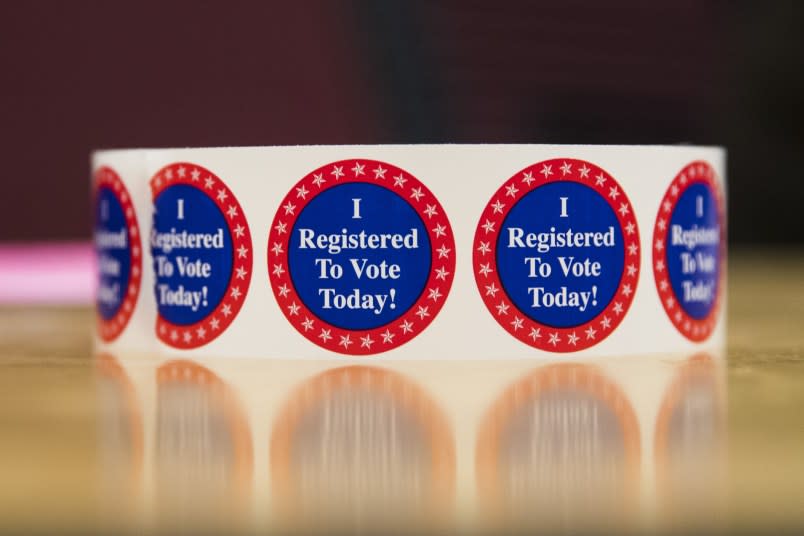Far-Right Group Recruits Followers To Overwhelm Election Offices With Voter Roll Challenges

True the Vote is enlisting private citizens to help it overwhelm under-staffed and under-resourced election offices with voter roll challenges ahead of election day.
“An IV3 user out of Pennsylvania is sorting through 17k ineligible records identified in her County! Great work!,” the right-wing election denying group True the Vote posted on Twitter Sunday. The tweet, which has since been deleted, then calls for voters to register to use IV3 so that they too can “get to work on the voter rolls” in their respective counties.
The post is the perfect encapsulation of a concerning effort by MAGA groups like True the Vote to recruit private citizens to sift through thousands of voter registrations to identify what they believe are ineligible voters in the voter rolls ahead of the 2024 presidential election in the fall. The effort to patrol voters with tools like IV3 — a technology that purports to identify ineligible voters — is also evidence of the way that voter roll maintenance is, as Alice Clapman, senior counsel in the Brennan Center’s Voting Rights Program, describes it, “getting swept up in the broader election denial of doubting election outcomes based on a variety of myths about how elections are run.”
“Everyone agrees that states and localities should do their best to maintain accurate voter rolls,” Clapman said, “but we have a set of professional administrators who have a set of professional practices they use to make sure that that is done responsibly.”
The election denial group developed IV3 in the aftermath of the 2020 election, after it helped spread lies about ballot stuffing in that election. It is now being used by True the Vote ahead of 2024 to perpetuate the false narrative that non-citizens will cast ballots in November, the conspiracy theory du jour for those helping Donald Trump lay the groundwork for another election challenge if he loses in the fall.
True the Vote, experts told TPM, is not merely trying to “work on the voter rolls” — states already have systems in place to ensure accuracy. Rather the group is attempting to arm regular citizens who likely don’t have much familiarity with voter list maintenance, with a tool to patrol fellow voters and mount baseless challenges to election officials.
True the Group, among other Big Lie conspiracy theory groups, are encouraging voters to participate in a “citizen-led effort” to “to ensure the accuracy of our nation’s voter rolls” using a technology that purports to identify ineligible voters. But the technology is flawed and is especially dangerous in that it encourages voters to file baseless voter eligibility complaints, flooding under resourced election offices with voter challenge.
“Organizations like True the Vote are using technology to try and legitimize faulty claims about massive voter fraud,” David Levine, senior elections integrity fellow at the Alliance for Securing Democracy, told TPM “and of course they are doing so without providing any empirical evidence.”
As Douglas Jones, a professor of computer science and election expert at the University of Iowa, noted in an email to TPM, the technology isn’t actually new, either.
“IV3 is just a front end package that aggregates voter data from the states and tries to mush it into a uniform format with a common search interface,” he said.
And the danger of something like IV3, he added, is that aggressive and careless maintenance of voter rolls can disenfranchise voters who shouldn’t be removed from the rolls.
“Removing someone from the voter rolls on the basis of hearsay evidence that they’ve moved is no good,” he said.
Vote rolls are never going to be exactly up to date in real time—-but that’s by design.
States have to follow a process per the The National Voter Registration Act, to make sure that a voter has actually moved before they are taken off the rolls to ensure they aren’t disenfranchised. It’s groups like True the Vote, with tools like IV3, explained Clapman that have capitalized on this fact as a way to further spread disinformation about the state of the voter rolls.
“The idea that people are going to be notified that they’ve been challenged because some fellow citizen doubts their right to vote is just inherently undemocratic,” said Clapman.
And since state voter files are constantly being updated with new information as more people become registered or move or have been confirmed as dead, the IV3 platform simply is not reflective of these changes in real time, Barry Burden, political science professor at at the University of Wisconsin-Madison and Director of the Elections Research Center told TPM.
Burden described the tool as “an amateur operation prone to reach mistaken conclusions.”
These calls to report “ineligible voters” are also an act of voter suppression. If a voter is frivolously challenged, which is more likely to happen with tools like IV3, it can serve as a deterrent to that voter casting a ballot in the future, even if they respond and remedy the challenge.
“The signal it [the baseless voter challenge] sends that they are not entitled to vote or that they don’t have fundamental rights, it’s like a deeply corrosive message that’s being sent by this movement to challenge large numbers of voters,” noted Clapman.

